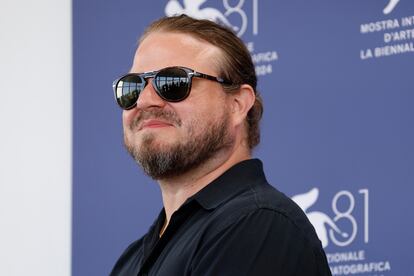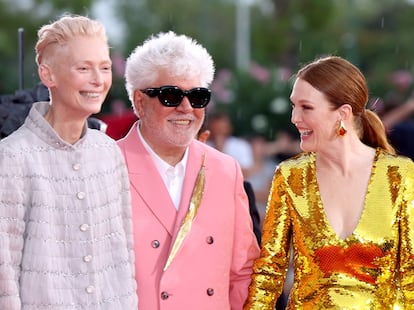A barrier separates the red carpet at the Venice Film Festival from the masses who come to see the stars parade. The reason is as obvious as it is sensible: to prevent the passion of the fans from swallowing up the actors, as well as the risk of accidents. The separation also allows the divas themselves to set the pace. They approach the public, sign autographs, pose for a photo, let themselves be adored for a while and leave. As they please. But this year the most coveted stars of the Mostra have raised a new wall, higher and more controversial: their silence.
Almost all of the most anticipated films of the festival, Maria to Wolfsof Queer to Babygirl, They have limited to a historic minimum, or even refused, any interview or activity with journalists. A press conference, out of obligation, and that’s it. The artistic director, Alberto Barbera, has not stopped repeating that the 81st edition, which ends tomorrow Saturday, has registered the largest attendance of celebrities in decades. There have never been so many. And, furthermore, after the void last year due to the actors’ strike. But they have never said so little. This has generated a statement of alarm signed by dozens of editors, and a protest that ended up becoming a question to Barbera, on the day of the opening. He responded that it is not the festival’s business, and there is little he can do.
These are distributors, sales agencies and, most likely, the directors and actors themselves. The model, lately, only made sense for promotion: journalists invited to an hour of vaporetto for “a 10-minute interview” with the director and the leading actress; and, on the other hand, interpreters locked in micro-chats one after another, where the questions are repeated identically, or round tables, where the questions fly from one topic to another without connection. The silence, in fact, has worked for the companies: the stars and their films have been talked about, although they have not said anything. And, incidentally, seeking a direct link with the public saves them from the critical filter of the press. Looking to the future, however, a rethinking of the model is needed. One more change, among many that cinema, industry and journalism face.

The good news is that, in the absence of the voices of filmmakers and performers, the films did count for a lot. A clue as to what the awards will bring tomorrow can be given by the lists with average ratings and stars awarded by Italian and international critics: The room next door, by Pedro Almodovar, Harvestby Athina Rachel Tsangari, Queer, by Luca Guadagnino and The BrutalistBrady Corbet’s The Last of Us is among the favourites. Although the most talked about film in the corridors was surely the latter. A colossal work in every sense: three and a half hours, a disproportionate narrative and cinematic ambition, shot in 70 millimetres and celluloid, a challenge for its distribution, as well as an unforgettable performance by Adrien Brody, already a candidate for the Oscar for best leading actor.
When the line-up was announced, it was surprising how few well-known names there were, by Venice standards. A posteriori, The mix has been successful. Pablo Larraín’s Maria Callas played by Angelina Jolie, the Folly of Two The Joker by Joaquin Phoenix and Lady Gaga, or the on-screen reunion between George Clooney and Brad Pitt, inevitably caught the spotlight. But there was room and glory for lesser-known films. And that, after all, is what it is all about: in addition to inviting and applauding Almodóvar and Guadagnino, the Lido must launch their heirs.

FABIO FRUSTACI (EFE)
Vermiglioby Maura Delpero —as almost always, of the four or five Italian works selected, one is really worthwhile—; The jockey, by Luis Ortega, as well as The Brutalist and Harvest They caused astonishment and fascination, they gave rise to new ideas, some mistakes and the desire to follow the future of their authors. Dea Kulumbegashvili is 38 years old and has only two films under her belt, but she already had a notable endorsement: her first film, Beginningwon four awards in San Sebastian in 2020, including the Golden Shell. April has confirmed a relentless director, faithful to her cinema to the last consequences, without concessions.
The Georgian author shows a failed birth and a clandestine abortion on screen in a still shot. Material to make the audience shudder and reflect. And to vindicate the right of every woman to voluntarily interrupt her pregnancy, just at a time when its repeal by the US Supreme Court and the battle against it by the Italian president, Giorgia Meloni, are trying to call it into question.
Curiously, another of the most significant events of the festival also came from Georgian cinema: the first screenings of the film The Antique, The film, which was selected in the parallel section Giornate degli Autori, was cancelled following a complaint filed by three companies before the Venice court over a dispute over the authorship of the film’s script. For the filmmaker, Rusudan Glurjidze, the real reason was obvious: “I am in the centre of Europe and I am being censored. It is very worrying.” Her theory links the Russian nationality of one of the three plaintiffs (the production company Viva Films) to the theme of the film: the mass expulsion of Georgian migrants in 2006.
Giornate degli Autori’s appeal against the ruling finally led to the court authorizing the film to be shown in theaters today, Friday. In Moscow, by the way, it would not be liked either. Russians at Wara documentary by Anastasia Trofimova, a filmmaker who infiltrated a battalion of Putin’s army on the Ukrainian front. And the other war that is shaking the world, the Israeli offensive in Gaza, also had its presence and controversy at the festival: some 300 artists encouraged people to boycott the feature film Why Warby Amos Gitai, because it was “created by production companies complicit with Israel that contribute to apartheid, occupation and now genocide.” The veteran director urged people to see the film first, and asserted that he has not received a single euro of public funding from the Israeli state.

At this festival, a flood of films from all genres and countries delved deeply into politics. And, above all, into the rise of the extreme right. Fiction and documentary, from yesterday and today, to try to denounce, but also to understand. The list grew longer every day: in the competition, The OrderJustin Kurzel’s thriller inspired by a supremacist terrorist gang that scared the US in 1983, or The Quiet Sonby Muriel and Delphine Coulin, about the radicalization of one of the two sons of a widowed father in France; a look at the past of the series M. The son of the centuryabout the rise of Mussolini and based on the biography of sweet by Antonio Scurati, or the documentary Riefenstahlabout the Nazi propaganda filmmaker. And the very recent questions of Homegrownwhich follows three extremist Trump supporters up to the assault on Congress on January 6, 2021, Separated, on the separation of minors and their families at the border imposed by the immigration policy of the former US president, or Apocalypse in the tropicsfocusing on how the rise of religious fundamentalism fueled former President Jair Bolsonaro’s victory in Brazil.
In reality, cinema has always told the story of the times in which it lives. So perhaps two other themes that dominated the Mostra were even more surprising. Even Barbera himself declared himself struck by another trend, especially in the main competition. There were very explicit sequences in Queer, The boom of the porn industry in Italy in Future Divafemale masturbation despite pressure and God’s gaze on her Vermiglioand Babygirl offered the most daring vision. A female director played by Nicole Kidman begins an extreme relationship of domination with a newly hired intern in order to address the boundaries between abuse, oppression, pleasure and consent. And to claim female sexual freedom.
Disclaimerby Alfonso Cuarón, also includes unabashedly erotic sequences. And New Years, by Rodrigo Sorogoyen, films moments of passionate oral sex. Both works, At the same time, they contributed to another trend of the event: the enormous interest in series, so much so that they are competing for the lead role with the seventh art, right at its oldest festival.. Families like ours, Thomas Vinterberg’s film, joined the Mexican filmmaker’s small-screen adventure
, confirmed the Spaniard’s talent and brought eight episodes about Mussolini to make television production one of the pillars of this edition. Another invitation to think deeply about the future. At least in the sector, ideas are never lacking: it is their daily bread.
All the culture that goes with you awaits you here.
Subscribe
Babelia
The latest literary releases analysed by the best critics in our weekly newsletter
RECEIVE IT
#political #sexual #exhibition #years
